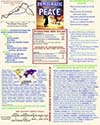
Peter Spiegel And Jonathan Weisman have published in The all Street Journal ”Behind Afghan War Debate, a Battle of Two Books Rages.” They say:
The two [books] draw decidedly different lessons from the Vietnam War. The first book describes a White House in 1965 being marched into an escalating war by a military viewing the conflict too narrowly to see the perils ahead. President Barack Obama recently finished the book, according to administration officials, and Vice President Joe Biden is reading it now.
The second describes a different administration, in 1972, when a U.S. military that has finally figured out how to counter the insurgency is rejected by political leaders who bow to popular opinion and end the fight.
It has been recommended in multiple lists put out by military officers, including a former U.S. commander in Afghanistan, who passed it out to his subordinates.
The two books -- "Lessons in Disaster," on Mr. Obama's nightstand, and "A Better War" on the shelves of military gurus -- have become a framework for the debate over what will be one of the most important decisions of Mr. Obama's presidency.
The American involvement in and retreat from the Vietnam War embodies a critical lesson currently for Afghanistan. To see this, however, requires a correct view of the war, which (with the distortions and untruths by the left and their media) is denied the public.
In the 1950s, communist North Vietnam began a guerrilla campaign to take over South Vietnam, a movement subsequently reinforced by the North’s army. By the early 1960s, the South was losing, and consistent with American foreign and defense policy of containing communism, Kennedy escalated our involvement of military advisors, and Johnson further with American combat forces and air power in 1963.
However, by 1964, the South was in bad shape, with defeat likely. So, using an alleged attack on American ships as a rationale, Congress gave President Johnson a blank check to fully engage American forces in defense of the South. He did, and eventually 550,000 troops were involved by 1969. At that time, the North was practically defeated. Its army had lost every battle. The Viet Cong guerrillas the North used and controlled were almost wiped out in their Tet Offensive. In effect, the war was almost over with an American victory and an independent South, but the North fought on, believing that they could win the war in Washington, if not in the South.
They were right. By 1969, the noisy anti-war activists had taken their toll. A barrage of public protests, and a hostile media gradually eroded the initial strong Democratic support for the war, eventually turning them against it. There was widespread belief (fueled by the media) that the South was corrupt, authoritarian, weakly defending itself, leaving it to the American forces to fight, and were losing to the North. In 1974 Congress, controlled by antiwar Democrats, voted to curtail funding for American military activities in Southeast Asia with an eventual total cutoff of all funding. This in effect ended the American war effort in South Vietnam. Denied military aid and air support, the South was defeated by a limited offensive that with increasing success became all out. In 1975, Saigon fell as American helicopters tried to save a handful of South Vietnamese.
The communist victory over the South eventually cost 528,000 lives in executions and deaths in re-education camps, and 250,000 more Boat People fleeing on the ocean. For the totals killed or murdered, see here.
What is the lesson for Afghanistan in this sorry and bloody story. With victory in Afghanistan within our reach. We need only the will and to use the resources we have in great measure. Therefore, listen to our commanders, surge as necessary, and do not let the left snatch defeat from the jaws of victory again.















The main problem in Afghanistan is not the Taleban. The taleban is merely a symptome of a process of state collapse which has happened since 1978 due to the Soviet involvement.
ReplyDeleteRight now, it is probably the Karzai government and those who are supposed to be NATO's allies who are the biggest obstacle. I doubt most of the Taleban are fanatically opposed to the Americans. Mostly, they seem to be farmboys and refugees lured by a certainty of life.
In Afghanistan of today, you have three career paths.
1. Corrupt government official
2. Opium-farmer
3. Taleban
4. Prostitute
The war won't be concluded until Afghanistan has a semi-functioning, non-sectarian state. But those who are in charge there seem to be more interested in keeping the status quo which greatly enrich themselves than to establish a functioning state.
In the meantime, due to obvious resentment with the state of the situation, the population will increasingly turn towards those who are against status quo.
For how long should an operation last? I think Gordon Brown said something about the 2040's. To make Afghanistan a functioning state which could jump when the west wants it to jump is clearly a titanic challenge.
Taliban support in Afghanistan was below 5% according a poll I saw. Since their more recent move to suicide bombings of non military targets, this support is not going to increase any time soon.
ReplyDeleteIn fact, I read an interesting article about Code Pink (a leftist anti-war group opposed to anything military related) visiting Afghanistan and coming away with a changed mind about the US military there. If these people could be convinced that the people really didn't want the Taliban in charge and need the military to stay, that is saying a lot.